
We’ve spent most of an entire year talking about AI.
Debating it, trying to understand and keep up with it, discussing its ethical and legal implications, and how it fits into our daily radio lives (if indeed it does).
Last week, I was honored to participate in a Town Meeting at the Country Radio Seminar with an impressive group of radio thought leaders: Mike McVay, Buzz Knight, and Zena Burns. I thought I had a pretty good idea of how this session might go. And I was wrong.
Mike got us going with a hilarious video of Joe Walsh reminding the world that until AI is good enough to trash a hotel room, it will never replace people – or rock musicians. He should know.
And the always well-read Buzz Knight had a strong book recommendation for the room.
Exactly one year ago, a less formal discussion of Artificial Intelligence took place at CRS. Zena was a Futuri employee at that time, and was left to answer some tough questions and harsh criticism about AI’s expected impact on Country radio and the business in general.
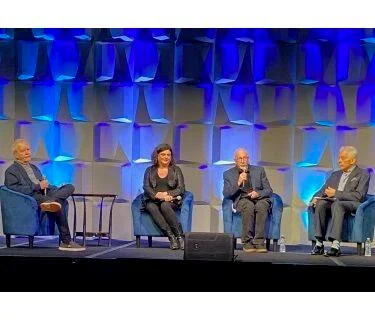
This year, we witnessed a 180. Zena ran an insta-poll to take the temperature of the room. And while emotional reactions were all over the place, “suspicious of AI” jumped into a slight, early lead. And yet, when the four us hit the floor armed with handheld mics to take questions and comments from the audience, cooler heads prevailed.
Earlier Zena reminded the group, “Those who fail to learn from history are doomed to repeat it,” referring to the Internet, social media, and other technology many broadcasters ignored or pooh-poohed.
And it turned out most CRS attendees didn’t get caught up in the deva vu of the moment. They talked about how various AI platforms and applications are already becoming routine at their stations. The session was positive, instructive, and loaded with good ideas.
I have to think that’s good news. Radio people have come to understand the importance – and value – of dealing with the reality of AI, so why not find applications that save time and money? And that’s precisely what we heard from more than a dozen CRS audience members during the Q&A segment of the Town Hall.

Alpha’s Phil Becker was in the room, the guy who brought AI Ashley to life last year in Portland, OR. He reminded the assembled Country pros about the importance of being transparent with the audience about robot DJs – something he has done since Day One.
Phil also congratulated the room on coming a long way during the past year. The JacoBLOG post about this AI “experiment” that started last year is here.
It was a reminder that radio people have the ability to utilize AI in any number of ways. But the audience very likely has something to say about the technology and their desire to hear it on their favorite stations.
Last year at CRS, I had my suspicions. This year, I had data.
Techsurvey 2024 came out of the field last month, another massive poll of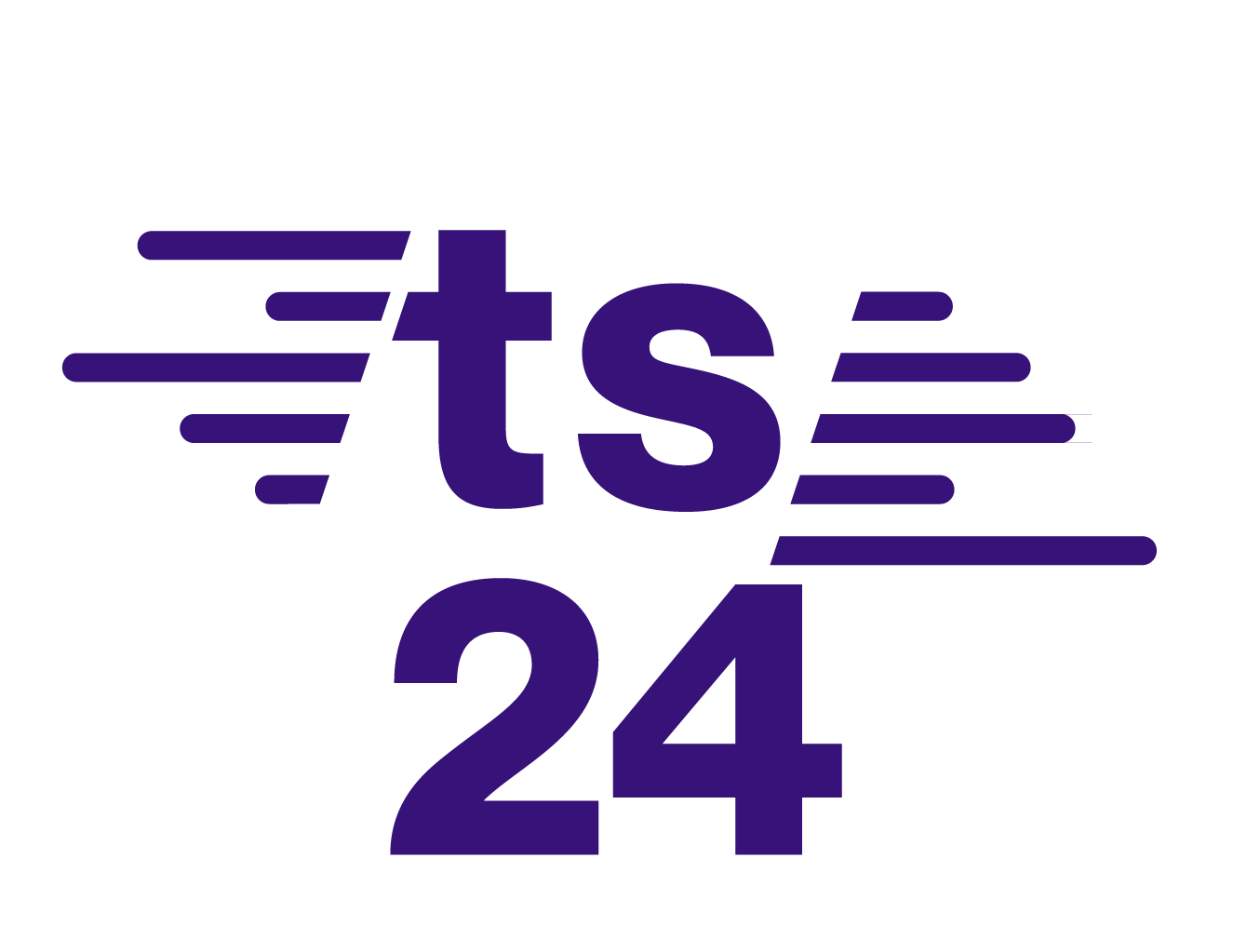 core radio listeners – more than 31,000 this time around from throughout the U.S. and Canada.
core radio listeners – more than 31,000 this time around from throughout the U.S. and Canada.
At CRS, I was able to give attendees a look at Country P1s. But in today’s blog post, I’ll give you a sneak peak at how AI rates among all format fans. If you believe in “Audience First,” this data provides a first look at how consumers perceive the technology, what scares them, and how radio might safely use AI on the air.
While 15% (the blue cross-hatched bar in the middle of the chart below) of the overall Techsurvey 2024 audience uses AI for work, school or personal use at least occasionally, devotees of Alternative and Sports Radio are considerably more likely to use this new cutting-edge technology.
Fans of Country, AC, Classic Rock and Classic Hits, not so much:
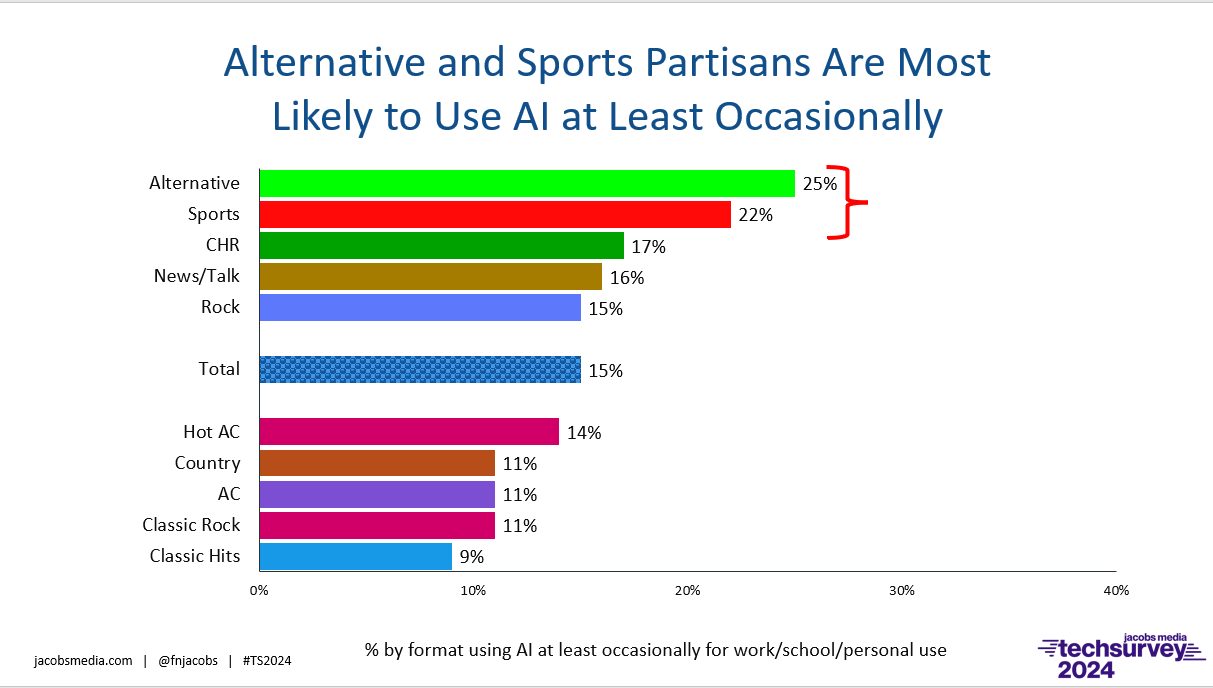
While many find the rapid growth of AI to be alarming, their greatest fear appears to be whether or how it will impact our upcoming elections later this year.
As we know, AI has already made an unscheduled appearance, cloning Joe Biden’s voice in a robocall last month in New Hampshire. It’s just the beginning.
In Techsurvey 2024, a majority (51%) of all respondents are “very concerned” about how AI could influence the 2024 elections. Not surprisingly, fans of News/Talk radio are most up in arms about the technology, followed by Classic Hits and Classic Rock partisans.
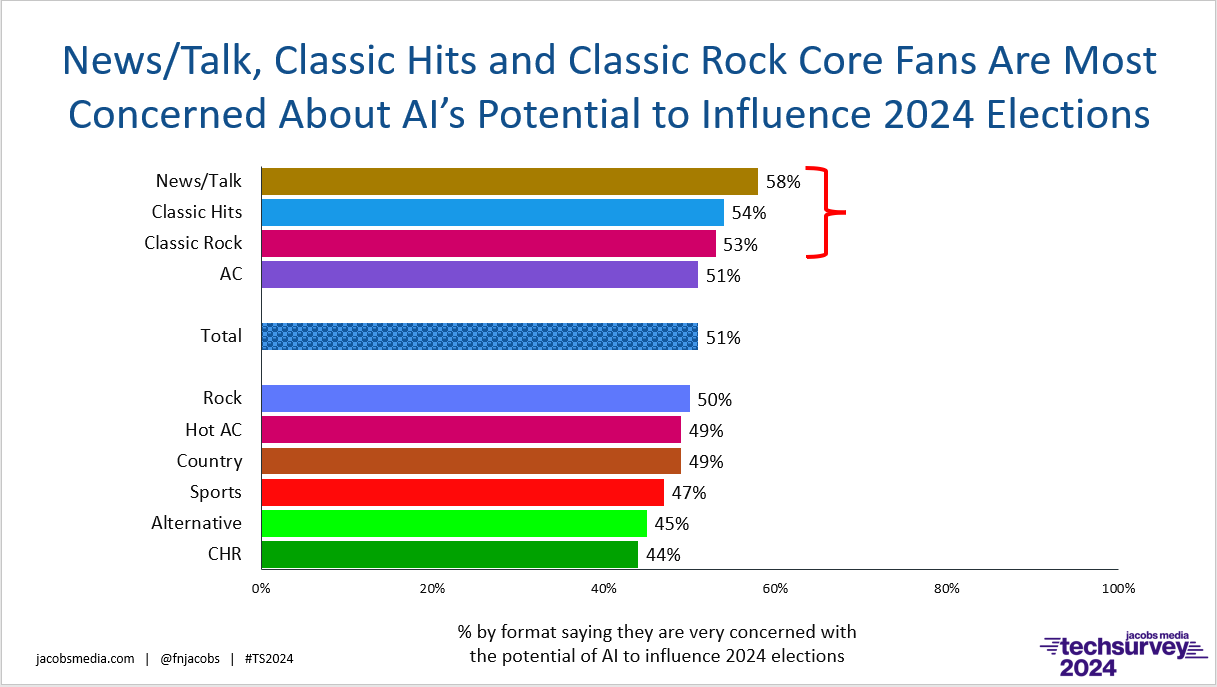
An NPR News story devoted to this issue sheds much light on how this might work. Reporter Huo Jingnan notes how AI-generated is actually harder to spot than video or images, making it easy to spread disinformation.
And he quotes Clemson University’s Darren Linvill:
“When you don’t even need people to write the content for you, it’s going to be even easier for bad actors to really reach a broad audience online.”
That leads us to governments – state and federal – stepping in to lay down the AI law. Is that what consumers want?
Absolutely. More than a third are looking for this technology to be “highly regulated” by the Feds. Women, fans of music stations, and in general, progressively older respondents are more apt to support strong legislation:
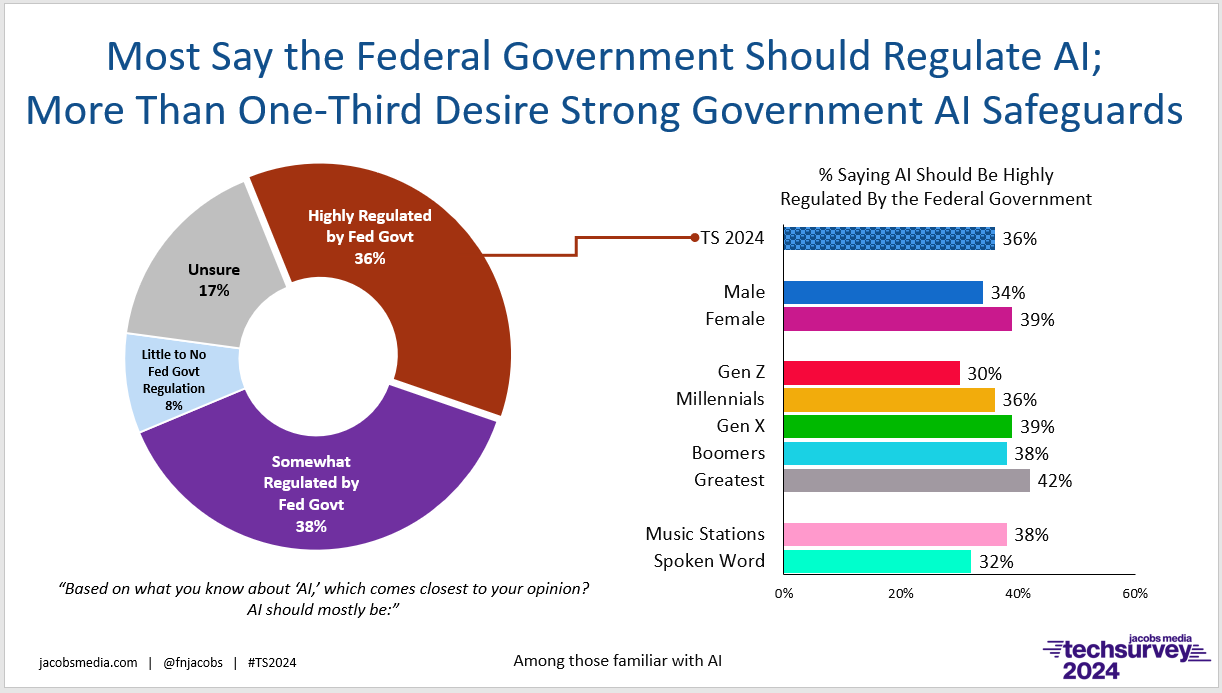
Knowledge of how radio audiences are thinking is power. We plan on tracking this initial benchmark data in future Techsurveys. Will consumers be more accepting of the widespread use of AI or will their skepticism grow?
And what does this mean for radio stations dabbling into AI? Where is the audience open to its usage, and where are they adamantly opposed to stations using it?
That’s the topic of tomorrow’s JacoBLOG post, another format-by-format breakout of AI-generated DJs, station identification, and commercials.
I’ll also have some thoughts on the AI book Buzz recommended.
This is the first data release to come out of Techsurvey 2024. After the presentation for stakeholders, we’ll host a free industry webinar. This year, TS 2024 is done in collaboration with Inside Radio and sponsored by Quu.
To read Part 2 of this post – What Radio Listeners Think Of Stations Using AI – click here.
P.S. To help you stay ahead of AI developments, uses, and thinking about how it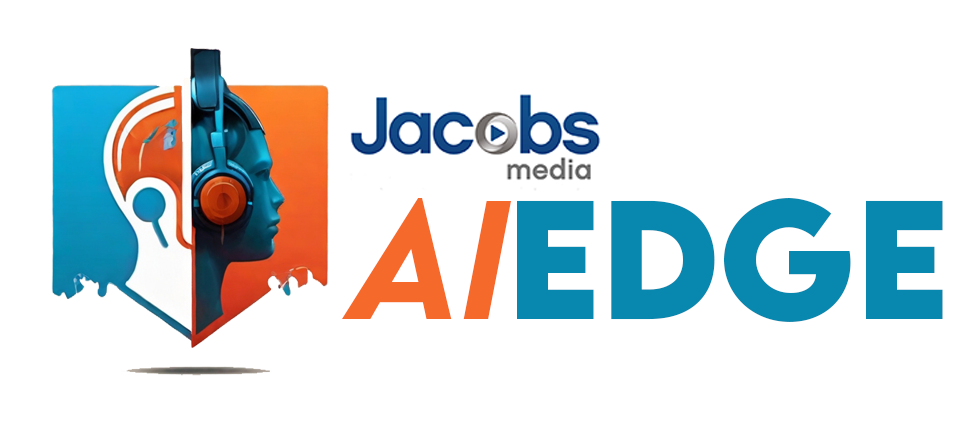 impacts radio, Jacobs Media’s Chris Brunt publishes a free newsletter, AI Edge. It’s a practical guide for radio broadcasters.
impacts radio, Jacobs Media’s Chris Brunt publishes a free newsletter, AI Edge. It’s a practical guide for radio broadcasters.
Click here to sign up for it and be sure you don’t miss a moment of how AI will impact radio broadcasting.
- It’s The Christian (Radio) Thing To Do - June 3, 2025
- Is It Time For Radio to WAKE UP?! - June 1, 2025
- For Radio, The Perils Of Rebranding - May 30, 2025




My biggest problem with AI is who or what it’s learning from. Just because an idea or concept is popular and pervasive doesn’t mean it’s correct. Unfortunately, AI lacks the ability to determine that. If they build an AI with common sense, they could really benefit humanity.
And hopefully, enough of us will have enough common sense to keep our value – and our jobs, Brian.
I went and asked ChatGPT what radio format would be most willing to use AI.
Here’s what he/she/it said:
Radio formats that rely heavily on music programming, such as mainstream pop, adult contemporary, and top 40, might be most willing to use AI. These formats often prioritize playing popular hits and maintaining a consistent sound to attract and retain listeners. AI can assist in tasks like playlist curation, scheduling, and even generating customized content based on listener preferences and behavior.
Additionally, talk radio formats could also benefit from AI, especially in tasks like content generation, speech-to-text transcription, and even hosting virtual assistants for interactive audience engagement.
Ultimately, any radio format that values efficiency, audience engagement, and staying up-to-date with technological advancements would likely be open to incorporating AI into their operations.
Certainly not poetic or profound, but a pretty good distillation of AI at this point.
Hi Fred,
Very interesting info from the Tech Survey results. Format and gender data was informative and sets the baseline for future surveys in the years to come.
David
Appreciate it, David.
I agree with the point about not learning from history. Look at newspapers. Classifed ads paid the bills for years. And reading the classified in the local alternative “weekly” was as entertaining as the other content in the paper. When online classifieds came along and newspapers lost that business and income.
There is an article on the Washington Post website (3/4/2024) that is a review of AI generated responses to questions posed in tax preparation software. Check it out for some food for thought .
Appreciate it, Jerry.